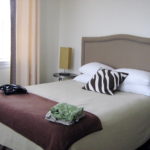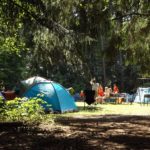L’Escala is a popular tourist destination near the earliest Greco-Roman settlement in Spain.
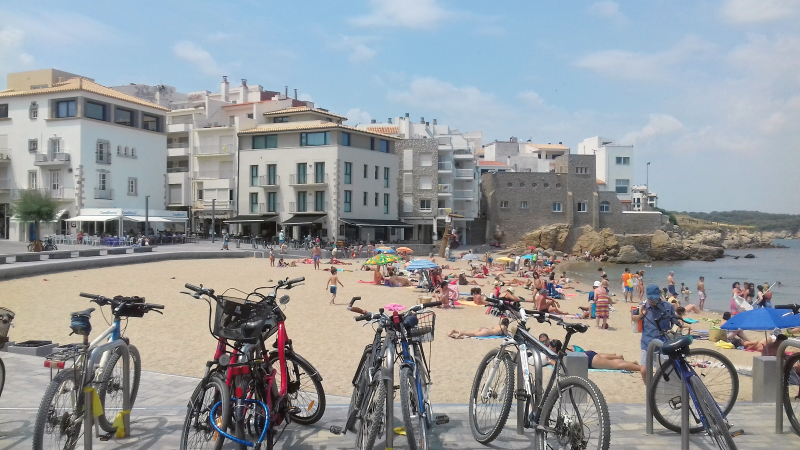
One of the beaches on L’Escala old town. Photo by David Leigh
Originally a fishing village famed for its anchovies, l’Escala has undergone considerable expansion over the last few decades. The narrow winding streets of the old town retain much of their character but most properties in the town are now holiday homes. During the winter the population tops 10,000 but during the summer months the tourists swarm the town.
L’Escala’s port has also undergone considerable expansion over the last two decades. While the port once catered mainly to the local fishing fleet it was expanded in the late 1990s to accommodate the large number of pleasure boats now moored in the marina. The fishing industry still continues but the number of fishing boats is massively outnumbered by the motor yachts, sailing boats and dinghies.
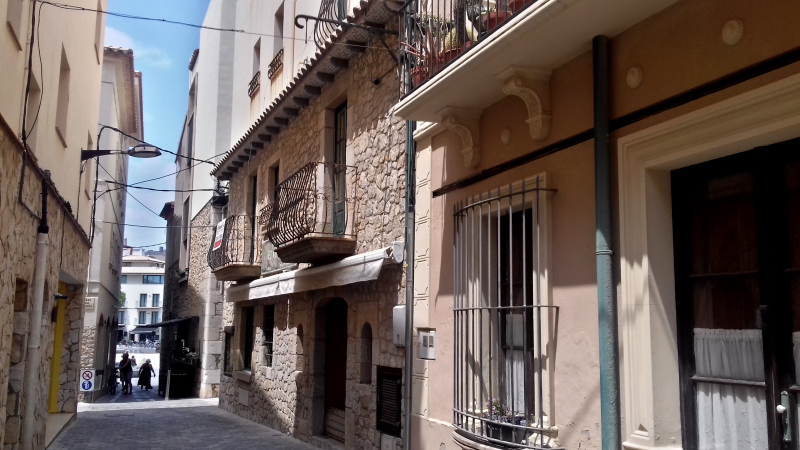
A street in the old town. Photo by David Leigh
The old town of l’Escala retains its charm and it is easy to pass time in one of the cafes in the small bays located there. That said, parking can be a problem, particularly in the height of the tourist season. This area has been considerable gentrified over the years and many of the properties have been renovated. The streets are shaded from the sun with many old stone fronted houses and comfortable to walk even in summer.
The town tends to be rather deserted off season and can seem a bit of a ghost town during the autumn and winter. While the weekends see some Catalans driving up from Barcelona and elsewhere to stay in their holiday homes most homes aren’t really designed for cold weather. And during the winter it can be pretty bleak, especially when the northerly Tramuntana blows off the snow caped Pyrenees. Older properties in particular were built without central heating although many, if not most, have a fireplace.
There are some foreign visitors over the Christmas and then Easter, but from late May and June is when things start to get busy.
From the end of July and throughout August l’Escala is packed with people, making getting around town difficult. Many people who live in l’Escala year round prefer the quiet months, but only you can know whether that suits you or not. There is not much in the way of entertainment off season.
Beaches
The main beach is Riells, a 600 metre curve of sand that is fairly shallow and good for kids, although you do need to wade out a bit if you want a serious swim. The beach gets a little too packed in the summer as tourists start to pack themselves together tight, like the anchovies the town is so famous for.
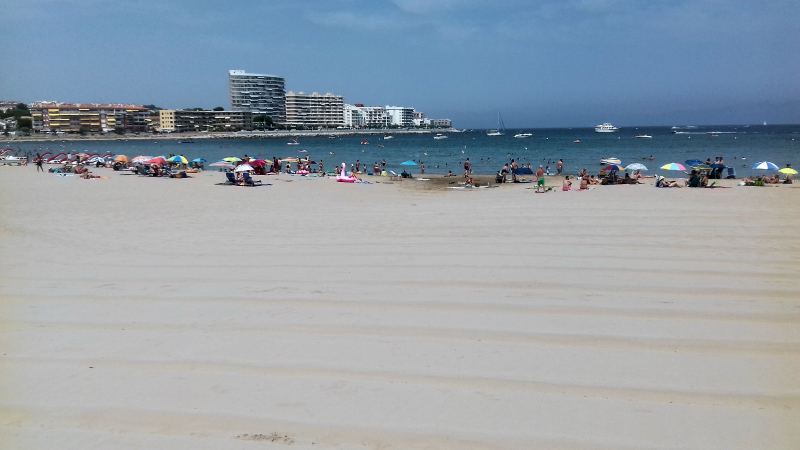
Riells beach in June. Photo by David Leigh
The beach at Cala Montgó is another option but with many campers staying nearby it can quickly get overcrowded. It’s a lovely bay though if you are visiting before the height of the season. Less densely populated is the beach at Empúries, in front of the archaeological site, probably because you have to pay for parking. Further on is El Riuet, with several kilometres of sand running up to Sant Pere Pescador.
Areas of this sandy beach are popular with nudists, and there are areas for windsurfing and kitesurfing. Here the less able kite-surfers can be a nuisance when they stray out of their area and start dive bombing you with their uncontrolled kites. However, it can get a little too windy here and rather than a peaceful afternoon swimming and sunbathing you get sand blasted instead.
On the other hand if you are on holiday with your dog then you can take your furry friend with you to El Riuet for a beach day. Make sure to provide adequate shelter from the sun and water for your dog though. They do love the beach too! Just make sure you are equipped to clear up their mess.
There is an official dog-friendly beach in l’Escala. Rec del Molí is the first beach you reach on the path leading from l’Escala to Sant Martí d’Empúries. The area nearest l’Escala is reserved for dogs. It’s clearly signposted so you don’t stray into the wrong area.
Read more about the beaches here
Where to stay
Most tourist accommodation in l’Escala consists of privately owned villas and apartments. Many are second residences for Catalans to escape the cities during weekends and summer but their is a considerable foreign ownership too.
There are a small number of hotels, but not to the extent of some other over developed towns. And many visitors stay in one of a number of campsites in and around the town.
Hotels Nieves Mar is the largest hotel in L’Escala and reopened in 2018 after extensive refurbishments. The 3-star hotel overlooks the bay and can trace its origins back to the early 20th century. Hostal Spa Empúries is a 4-star eco-hotel near the ruins at Empúries. Or if an old stone mill house with great restaurant is more your style then El Molí should fit the bill. For more choice check our page on L’Escala hotels.
There is a good choice of campsites too, with sites in the town near the police station, close to Riells beach and near the popular Montgò beach. Between them they have the usual mix of pitches suitable for tents, caravans and campervans as well as rental chalets.
Eating out and eating in
Gastronomy wise, you’ll find the usual mix of restaurants serving locally caught seafood, traditional Catalan dishes and paella. You’ll also find a choice of the usual international burger chains, numerous pizzerias, restaurants catering for specific foreign tastes such as a Belgian style mussels, fries and beer.
Sant Martí de Empúries has a number of restaurants in the main square including Meson del Conde. During summer the queues for a table are just too long and the staff are overworked. Far better to go off season, particularly if you can get a table in the 19th century stone house rather than the glasshouse. Go for the calçotada when available during the winter months.
Other notable restaurants include Cal Galan and the restaurants belonging to the boutique Taverna de la Sal hotel. The gastronomic menu of El Molí offers a modern take on Catalan cuisine. For an easy takeaway meal you can order a spit roasted chicken from one of several rotisseries. Or head to one of the numerous restaurants overlooking Cala Montgó. La Garrota is lovely to visit at night, with a great view over the bay and the last stragglers on the beach making the most of it in the dark. As you might expect the restaurant is skewed towards fish and seafood but there are meat dishes too. The mejillones marinera (fisherman’s style mussels) are always good as a starter there.
L’Escala seems to have too many supermarkets for the population size. Years ago the only supermakets were smallish family run businesses but these days they range from the Catalan BonPreu to Spanish Mercadona and Dia, as well as foreign owned Aldi, Lidl and Carrefour. These are all big shops with plenty of parking holding a big range of food. Depending on the store you visit you can pick up essentials such as Marmite and Colman’s mustard although sadly popadoms and Stilton cheese seem to have vanished from the shelves without explanation. There is also a variety of bakers, fishmongers, butchers and shops selling fresh fruit and veg.
What to see and do
L’Escala is one of the few remaining towns on the Costa Brava with a working fishing fleet. The town is renowned for its anchovies, which outside L’Escala can be found in supermarkets across Catalonia. While there are several companies involved with preserving the fish, the most emblematic one is from Anxoves de L’Escala with a distinctive yellow label and red and black text, but you can tour the Anxoves Solés factory and museum, which includes tastings.
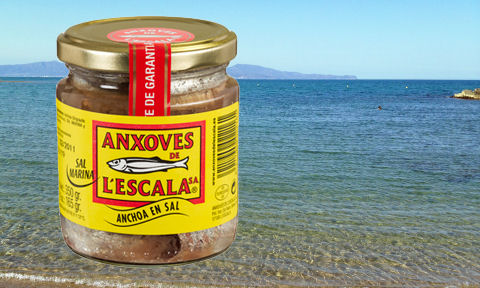
L’Escala’s famed anchovies are prepared using a method introduced by the Greeks that uses salt to preserve the fish rather than the more common oil. As a result salt was an important commodity in the town. Today the salt ships that in days gone by would deliver salt to l’Escala are commemorated every September in the Festa de Sal (Salt Festival).
As well as anchovies, the town is well known for diving, with a number of dive centres operating from the port. The dive centres each offer up to three boat dives a day to locations along the local coastline, as well as making the longer journey to the Medes. You may find it more comfortable to drive to Estartit and use a local dive centre as the journey from l’Escala lasts 45 minutes or so.
But there are a number of decent dive sites in L’Escala, including a couple of wrecks. One of these was a boat that sank in Barcelona harbour. It was re-floated and then sunk again in about 30 metres of water with the idea of creating an interesting dive site to reduce damage caused by divers at other dive sites. The second is a boat transporting marble from Italy. It sank during a storm and can be found about a mile offshore in 40 meters of water. It’s for advanced divers only but in good condition and worthwhile the considerable decompression time required if you spend any length of time down there.
You can also take a diving course. The dive centres tend to be affiliated with PADI and beginners can take the Open Water certification, or divers with some experience can continue their dive education with the Advanced Open Water or Rescue Diver courses. And there are diving “baptisms” for those who want to try scuba diving without committing to an entire course.
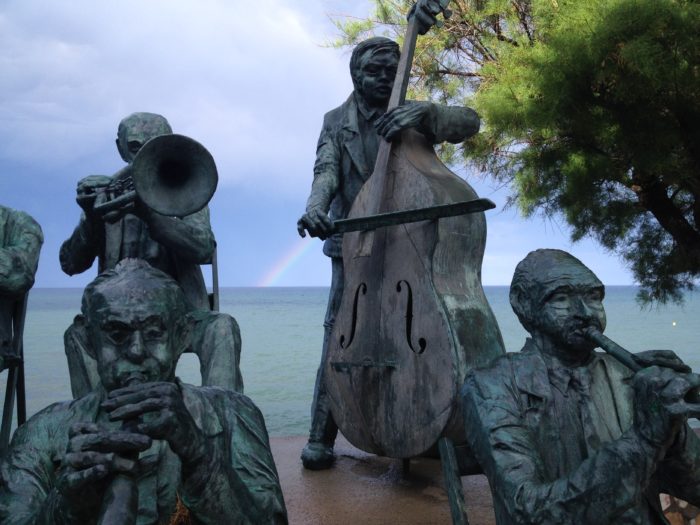
A statue on the seafront in l’Escala. Photo by David Leigh.
There are also boat excursions that travel up and down the coast, including glass bottomed boats for examining the undersea world, which is great for kids and adults alike. And from the beaches there are plenty of other activities such as kayaking, windsurfing and sailing for all levels of experience. Now may be the ideal opportunity to start lessons while on holiday.
Jet skis and boats are also available for hire. although for the latter you need deep pockets. L’Escala is also home to the go-kart track where a young Fernando Alonso honed his driving skills prior to progressing to cars and Formula One. At the top of Riells beach is Luna Park, an amusement park with a range of rides and games.
And don’t forget to visit the Greco-Roman ruins at Empúries. It is the site of the oldest Greek settlement in Spain. There is also an anchovy and salt museum and a former salt store.

